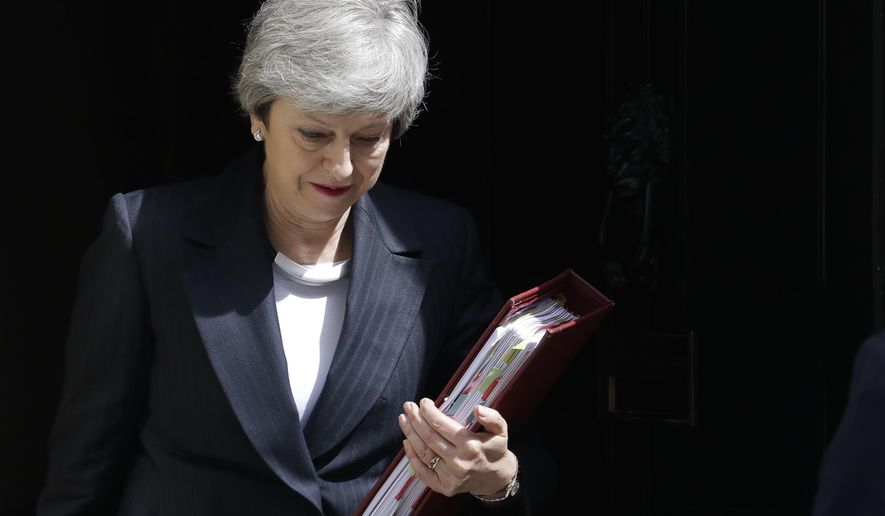OPINION:
The lady is clearly in distress, and no one’s there to help her. Only a churl would say, even if true, Theresa May brought it on herself.
She never wanted to lead Britain out of the European Union, but she’s probably entitled to give herself a B or maybe a C for effort. A grade of C might be worth a cup of tea at Starbucks, but she’ll have to pay extra for lemon or cream.
She has been called “dead in the water” for weeks. She has been humiliated three times in Parliament, where her scheme for making an exit from the European Union has been thrice rejected. She has clearly lost the confidence of her party, if not the confidence of her people. She has been on the way out so many times that John O’Sullivan, the British commentator writing in the National Review, says she reminds him of a character in an Ernst Lubitsch movie who tells a rival for a lady’s hand, “See here, you keep saying that you’re leaving and then you stay, why don’t you say you’ll stay, and then leave.”
Dead in the water the prime minister may be, but she’s a lively corpse, and she’s got lively company. Her Tories, as England calls the conservatives, are in a more entertaining mess than the Democrats in the colonies, thrashing about as if they don’t know where they’re going.
Survival is her game now, personal survival at all costs. She will present her warmed-over Brexit plan to the House of Commons for the fourth time on June 3, and if it fails, as nearly everyone in London expects it to, she will certainly follow it to oblivion. After that a new prime minister will take charge. Boris Johnson, an accidental native of New York City and her first foreign secretary, may well be that new prime minister, and he’s for just getting out of Europe while the getting is good. The formula for that is “a hard Brexit,” just saying “so long, not necessarily good to know you.”
The conventional wisdom in London, and the conventional wisdom is not always wrong, is that her warmed-over Brexit proposal will be defeated decisively on June 3. The third time is not the charm this time, either, and the margin of defeat will be the largest yet.
If there’s not actually a death watch on the sidewalk outside 10 Downing Street, there’s no scarcity of Tory members of Parliament, some obscure, and all eager to offer themselves as an alternate to Boris Johnson. John O’Sullivan, who clearly watches a lot of movies, says a poster for “Jaws 2” accurately describes what’s going on in Old Blighty. The poster shows “a pretty bikini-clad water skier blithely cresting the waves as, unseen behind her, a huge shark is erupting from the water and about to swallow her up. The shark in question is wearing a dark pin-striped suit and its name is Nigel Farage. The pretty young thing represents the mainstream political parties, especially Labor and the Conservatives.”
Founding a successful political party is almost as difficult in Britain as in America, where the last time a new party elected a president was 160 years ago, and the Republicans had Abraham Lincoln at the top of the ticket. It might be easier than that in Britain, but not by a lot. Nigel Farage put the Brexit Party together over a fortnight only a month ago, and Brexit had the largest bloc of support of the British parties in the European Parliament elections that began Thursday. Results won’t be known until Sunday, but the most recent public-opinion polls show the Brexit Party holding at 37 percent, a rough tie with Labor, and the Tories at an astonishing 7 percent. How low have the mighty fallen.
Some old-establishment Tories, whistling past the grave yard and afraid to look lest they see freshly dug holes in the ground that look about the right size to fit a Tory, try to cheer themselves that the Brexit Party is, after all, a phenomenon confined to England. But that’s belied by the fact that it is now regarded as second only to Labor in Scotland, and is the largest party in Wales. Who can blame a Tory for not wanting to look?
The big crowds Nigel Farage is drawing across Britain are a lot like Donald Trump’s in America, huge, festive, good-humored, both entertaining and serious, the kind every candidate dreams of.
Brexit got another break on the eve of the European elections. Jean-Claude Juncker, the president of the European Union, dismissed Brexit with the kind of insult money can’t buy. “These stupid nationalists,” he told CNN News, “they’re in love with their own country.”
• Wesley Pruden is editor in chief emeritus of The Times.




Please read our comment policy before commenting.